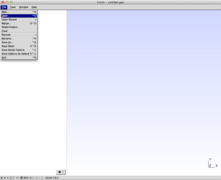Difference between revisions of "GetDP"
(→Getting started) |
|||
| Line 20: | Line 20: | ||
= Featured GetDP models = | = Featured GetDP models = | ||
| + | {| class="wikitable" | ||
| + | ! Electromagnetism | ||
| + | |- | ||
| + | | style="width: 100%;" | | ||
* [[Inductor|Simple inductor/core system]] | * [[Inductor|Simple inductor/core system]] | ||
* [[Electric_Machines|Rotating electric machines]] | * [[Electric_Machines|Rotating electric machines]] | ||
* [[Electromechanical_Relay|Electromechanical relay]] | * [[Electromechanical_Relay|Electromechanical relay]] | ||
| − | |||
* [[Magnetometer|Xylophone bar magnetometer]] | * [[Magnetometer|Xylophone bar magnetometer]] | ||
* [[Antennas]] | * [[Antennas]] | ||
| − | * [[Acoustic Scattering| | + | * [[Shielding effectiveness]] |
| − | * [[Time reversal]] | + | |} |
| + | |||
| + | = Academic cases for Learners = | ||
| + | |||
| + | These benchmarks are for graduate students and researchers who plan to propose new benchmarks using GetDP. The codes are as simple as possible in order to make easier the learning of the syntax. We present separately some basis of the numerical schemes and academic benchmarks. | ||
| + | |||
| + | {| class="wikitable" | ||
| + | !Numerical schemes | ||
| + | !Academic benchmarks | ||
| + | |- | ||
| + | | style="width: 50%" | | ||
| + | * [[Numerical schemes: Laplace's equation|Laplace's equation]] | ||
| + | * [[Numerical schemes: Heat equation|Heat equation]] | ||
| + | * [[Electrostatics]] | ||
| + | * [[Numerical_schemes:_Wave_propagation|Wave propagation]] | ||
| + | | style="width: 50%" | | ||
| + | * [[Laplace equation with Neumann boundary condition]] | ||
| + | * [[Laplace equation with Dirichlet boundary condition]] | ||
| + | * [[Heat equation with Dirichlet boundary control]] | ||
| + | * [[Coupled problems]] | ||
| + | * Eigenvalues problems | ||
| + | |} | ||
| + | |||
| + | = Advanced cases for Researchers = | ||
| + | |||
| + | Advanced numerical methods are presented through these benchmarks. They are mainly dedicated to researchers. | ||
| + | |||
| + | * [[Magnetodynamics with cohomology conditions]] | ||
| + | * [[Acoustic Scattering|Scattering in acoustics]] | ||
| + | * [[Time reversal|Time reversal in acoustics]] | ||
= All GetDP models = | = All GetDP models = | ||
| − | [[:Category:GetDP]] | + | [[:Category:GetDP|All GetDP models]] |
= How does it work? = | = How does it work? = | ||
Revision as of 00:13, 10 January 2014
GetDP is a rather general open source finite element solver using mixed elements to discretize de Rham-type complexes in one, two and three dimensions. GetDP is developed by the ACE group from the Montefiore Institute at the University of Liège, and is released under the GNU GPL.
Contents
Getting started
ONELAB allows to use GetDP as a black-box solver: you don't need to know anything about finite elements or de Rham complexes in order to run your first simulations:
- Download and uncompress the Gmsh/GetDP bundle for Windows64, Windows32, Linux64, Linux32 or MacOSX. (If you prefer you can of course also download and install Gmsh and GetDP independently. Please note that the examples below require very recent versions of Gmsh and GetDP, i.e., nightly builds made after December 4th, 2013. Current stable versions will not work.)
- Double-click on the Gmsh executable (gmsh.exe Error creating thumbnail: Unable to save thumbnail to destinationon Windows).
- Load one of the GetDP models (.pro file) through the File/Open menu, e.g. inductor.pro for the simple inductor/core example.
- Click on Run.
- ... that's it!
Note that on Windows, depending on your computer security settings, you might have to explicitly allow the GetDP executable to be launched by Gmsh. Manually launch GetDP once by double-clicking on getdp.exe to allow this.
- GmshGetDP 2.png
Click on Run to launch a computation. You can change any parameter and then Run again!
Featured GetDP models
| Electromagnetism |
|---|
Academic cases for Learners
These benchmarks are for graduate students and researchers who plan to propose new benchmarks using GetDP. The codes are as simple as possible in order to make easier the learning of the syntax. We present separately some basis of the numerical schemes and academic benchmarks.
| Numerical schemes | Academic benchmarks |
|---|---|
Advanced cases for Researchers
Advanced numerical methods are presented through these benchmarks. They are mainly dedicated to researchers.
All GetDP models
How does it work?
GetDP input files (.pro files) can be instrumented to share parameters with the ONELAB server, through the same syntax as the one used in Gmsh.


